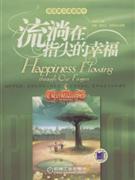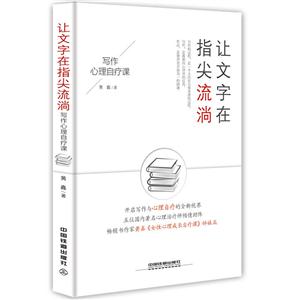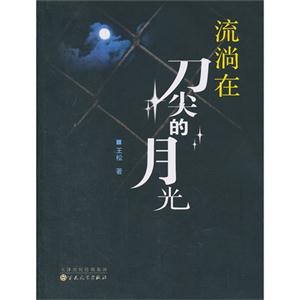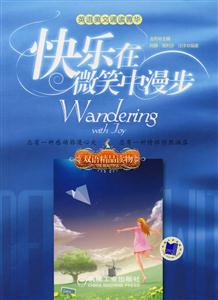
作者:何静
页数:188
出版社:机械工业出版社
出版日期:2008
ISBN:9787111230663
电子书格式:pdf/epub/txt
本书特色
拥有爱,就是幸福。心中有爱的人,幸福便充盈弥漫开来,流淌在指尖,触动
心弦,令人如饮甘饴。本书精选几十篇中英文对照的经典美文,细数爱情的相遇相
知、爱恨痴缠;道尽亲情的温馨甜蜜、感人肺腑。书中字里行间种种情怀千回百转,
丝丝爱意萦绕心头。
节选
的文字是心灵的古典音乐,流淌着来自生命深处的自然吟唱。美好
的文字,纯净如水,可以洗涤燥渴的灵魂。清冽的文字,如幽谷中纤尘不染
的百合,静静地绽放。哲思幽远的文字,回味无穷,一如午后香醇的咖啡。
情思隽永的语句,温馨如春日和风,浪漫如夏日雨丝。
经典传唱的文字,一如泰戈尔所言:“你是谁,读者,百年之后读着我的
诗?我无法从春天的财富里为你送去一朵鲜花,从远方的云里为你送去一缕
金霞。打开门向四周看看,从你繁花盛开的园中采集百年前消失了的鲜花的
芬芳记忆。在你心中的欢乐里,愿你吟唱春日清晨的鲜活的喜悦,让欢快的
声音穿越一百年的时光。”
漫漫人生路,浩瀚书海,我们领略到的,也许远远不只这些。只是,只
要你打开这些闪耀着挚爱、珍爱、友情、激励、感动和感恩光辉的书页,就
能契入生命的美好,每时每刻。
《流淌在指尖的幸福》:拥有爱,就是幸福。心中有爱的人,幸福便充盈
弥漫开来,流淌在指尖,触动心弦,令人如饮甘饴。本书精选几十篇中英文
对照的经典美文,细数爱情的相遇相知、爱恨痴缠;道尽亲情的温馨甜蜜、
感人肺腑。书中字里行间种种情怀千回百转,丝丝爱意萦绕心头。
《快乐在微笑中漫步》:微笑,是带着体温的一缕阳光,溶化世间的人情
冷暖;是滋养心灵的一汪甘泉,让爱在心中开出快乐的花朵。爱是微笑的,
微笑是快乐的。本书精选数十篇中英文对照的经典美文,记录了这世间至上
的大爱,爱朋友,爱陌生人,爱这世间的万物生灵,让欢喜、慈悲、感动、
感恩汇作一股不息的快乐甘泉。让快乐,从微笑开始。
《梦想起飞的地方》:只要打开梦想的翅膀,就能翱翔生命的蓝天。有梦
想,便能在黑暗中看到光明;有智慧,便能在平淡中创造辉煌。心有多大,
梦想的舞台就有多大。本书收录了数十篇中英文对照的经典哲理故事及小品
文,畅谈人生理想、励志哲思,传递着智慧超越的人生理念,引导梦想踏上
成功的道路。
《路过春天的时光》:春天的芬芳足以包容世间的美好。在春光中驻足,
品一杯香醇的咖啡,沏一壶清新的茶,感受唯美,体味人生的优雅与从容。
本书精选数十篇哲理生活小品文,细数人生的千姿百态,畅想优雅人生,优
雅地相爱,优雅地生活,优雅地老去。
原汁原味的英语,绚丽优美的译文,赶紧来享受这华美的饕餮盛宴吧!
在本书的编辑过程中,世纪友好工作室的蒋志华老师以及王发明、展萍、
宋李戈、丁哲、关晓蕙等同事对本书的结构及编排提供了大量的帮助,在此
特向他们表示诚挚的谢意。
编 者
When you were growing up. did you ever wish that your parents were happy?
Did vou feel safe when they were happy and peaceful?
My mother was rarely a happy person. Most of the time she was anxious, angry
and felt overburdened, even though I was her only child. She rarely laughed and was
often upset with me, or my father. Clearly, she made both of us responsible for her
happiness and we consistently fell short.
I would have given anything to have had a happy mother-a mother who knew
how to take responsibility for her own happiness and pain. I would have loved to have
had a mother who showed me how to take loving care of myself instead of showing me
how to be an unhappy martyr.
Often, in my counseling work with parents, I ask them if their parents were
happy. Most of the time they say no. I ask them if they wanted their parents to be
happy and invariably they say, “Yes, I would have loved it.” Yet these same parents
are not taking responsibility for making themselves happy now. They are acting just
like their parents — anxious, angry, depressed, withdrawn, resistant, or compliant.
They are controlling with each other or with their children in the same ways their
parents were controlling.
“As parents,” I say to them, “it is your responsibility to learn how to make
yourselves happy so you can be role models for your children. How can your children
learn how to take emotional responsibility if you don’t? Right now, you are role
modeling being a victim of your circumstances instead of being an emotionally
responsible adult. You are using your anger, upsets and unhappiness to control your
children, or you are putting yourself aside to take care of everyone but yourself. How
can they learn to take care of themselves if you are not taking care of yourselves?”
Many parents take care of externals: they keep the house clean, they are on time,
they pay their bills, and they earn money. Some parents even take care of their
physical health by eating well and getting enough exercise. But many parents fail to
take care of their emotional wellbeing.
Taking care of your emotional wellbeing means that you recognize that you cause
your own feelings with your thoughts and actions. When you think and behave in ways
that are unloving to yourself or others — that are not in your highest good –you will
be unhappy. When you think and behave in ways that are loving to yourself and
others- that are in your highest good — you will be happy. Your positive or
negative emotions are completely the result of your own thoughts and actions.
If you operate from the belief that how your children act, or how your parmer
acts, or how your external life is, causes your feelings, then you are operating as a
victim. As a victim, your happiness is dependent upon others doing what you want
them to do and on getting the outcomes you want. If this is your belief system, then
you are teaching your children to be victims.
Taking emotional responsibility means staying tuned into your own feelings and
immediately shifting your thought process and actions when you are feeling negative
feelings. It means that you learn to access a spiritual source of inner guidance to help
you know how to take loving care of yourself. You need to learn to turn to your
spiritual guidance to help you think the thoughts and take the actions that are tree and in
harmony with your soul, rather than operating from the false beliefs that cause you pain.
Do not kid yourself into thinking that as long as you are there for your children
you are being good parents. You also need to learn to be there for yourself so that you
can be a happy and peaceful parent.
做个快乐的家长
当你渐渐长大,你可曾希望过你的父母要活得开心?当他们幸福安宁的时
候,你是否也感到安全一些呢?
我的母亲是一个很少快乐的人。大部分时间,她都是感到焦虑、生气而且感
到负担过多,尽管我是她惟一的孩子。她很少笑,经常生我或是父亲的气。显
然,她把自己快乐的责任推给了我俩,而我们总是感到欠她的。
我宁愿倾我所有来换取一个快乐的母亲——一个懂得如何为自己的快乐和痛
苦负责的母亲。我宁愿有一位这样的母亲:她会教给我如何关爱自己,而不是教
给我怎样做一个不快乐的殉情者。
通常,当有家长来向我咨询时,我会问他们是否快乐。而他们往往都说“不
快乐”。我问他们是否想要他们的父母开心起来,而他们的回答总是一成不变的
“是的。我宁愿那样。”然而,同为父母,他们自己现在就不快乐。他们表现的就
如同他们的父母一样——焦虑、生气、沮丧、孤独、抗拒或顺从。他们把自己的
感情交给另一半或子女来掌控,这正是他们的父母把握自己的情绪的方法。
我对他们说:作为家长,你们有责任学会如何让自己开心起来,这样,你们
才能为子女做出榜样。如果你们都不能主宰自己的感情的话,那你们的孩子又怎
能做到呢?现在,你们正身体力行地为演示如何做一个环境的牺牲者,而不是在
示范如何做一个主宰自己感情的大人。你们正利用你们的愤怒、心烦意乱和忧愁
来控制着你们的孩子,或者你置自己于不顾,而去照顾每一个家人。可是,如果
你都不好好照顾自己,他们又怎能学会照料自己呢?














